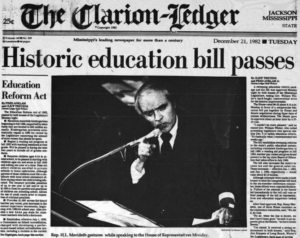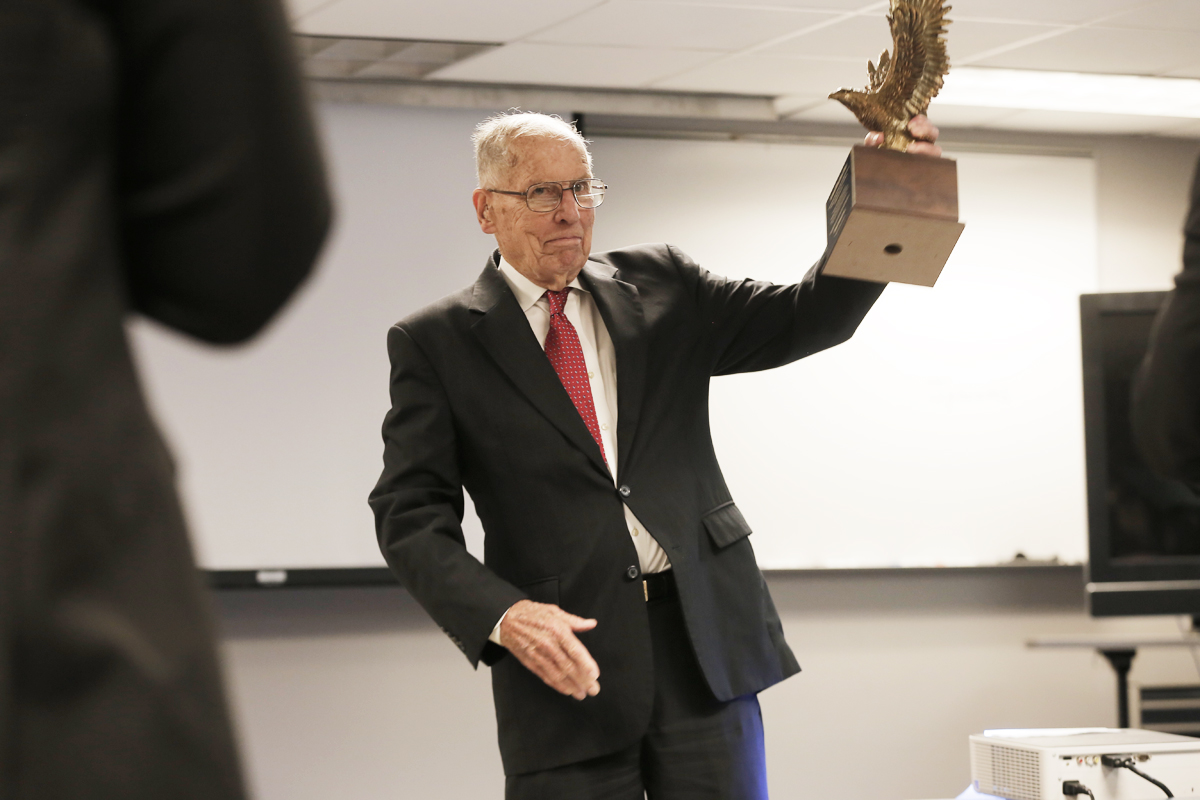JACKSON, Miss. – Former Mississippi Gov. William Winter, who championed education initiatives, job creation and racial harmony throughout his life, died Friday, Dec. 18, 2020, at age 97.
Known as Mississippi’s “education governor,” Winter secured passage of landmark educational initiatives in 1982 bringing kindergartens, compulsory school attendance, and a range of other key reforms to a state plagued by poverty and illiteracy. During his remarkable 75 years of public service, Winter linked education with economic development in the nation’s poorest state, observing, “The road out of the poor house runs past the school house.”

In 2003 remarks, the historian David Halberstam referred to Winter as “Mississippi’s best and strongest governor of modern times.” Halberstam went on to say, “Winter, more than any other politician, is the architect of the new Mississippi and the new America. By contrast, we are all too aware of politicians who can play to the darker side of our nature.”
In the 1950s and early 1960s, Winter stood in staunch opposition to the Ku Klux Klan and the White Citizens Councils—organizations that advocated for strict racial segregation, at times through violent means. Still, he served in the Mississippi Legislature and as state tax collector, state treasurer, lieutenant governor and ultimately as governor from 1980 to 1984.
Winter’s political courage was recognized on the national stage when he received the John F. Kennedy Profiles in Courage Award in 2008. Presidential adviser Vernon Jordan eloquently commented that “Governor Winter exhibited courage throughout his career, a willingness to speak out, to stand up, to be daring.”
Entry Into Mississippi’s Political Arena
After service in the U.S. Army during World War II, Winter was elected to the Mississippi Legislature in 1947 while still a student at the Ole Miss Law School. In a bid for progressive reforms, Winter ran for speaker of the Mississippi House against the long-serving and powerful House Speaker Walter Sillers. The bid was unsuccessful but solidified Winter’s reputation as a courageous advocate of political, economic, and educational reforms.

In 1956 Gov. J.P. Coleman appointed Winter as state tax collector with responsibility for collecting the state’s black-market tax on whiskey and liquor at a time when alcohol sales in the state were outlawed. In that position Winter was the second-highest paid officeholder in the nation right behind the president of the United States. As a good government initiative. Winter successfully advocated abolishing the position of state tax collector. He went on to be elected state treasurer.
Winter ran for governor for the first time in 1967. After Winter led in the first primary, the Klan threatened his life for being too open-minded on race. He persisted with the campaign despite death threats, but John Bell Williams ultimately defeated him in the second primary.
In 1971 Winter was elected lieutenant governor, continuing his advocacy of education enhancement and job creation. He ran a second time in 1975 for governor, losing to Cliff Finch whose campaign was high on theatrics.
‘The Mississippi Miracle’: Education Reform
After returning to his law practice, Winter ran for governor again in 1979, this time successfully. Winter’s slogan in that campaign was, “William Winter for Governor: The Toughest Job in Mississippi.” That slogan foretold the tough, complex battles Winter faced in dealing with the Mississippi Legislature on his signature education reforms.
When Winter became governor, Mississippi was the nation’s only state without compulsory school attendance and was one of only two states without a statewide system of kindergartens.

A recalcitrant Mississippi Legislature defeated Gov. Winter’s progressive educational initiatives twice. Only on his third attempt and after mounting an intensive effort to gain grassroots citizen support, do the Legislature finally pass Winter’s educational reforms by a scant one vote. The Clarion-Ledger newspaper won the Pulitzer Prize for Public Service based on its in-depth coverage of the legislation that brought a statewide system of kindergartens and compulsory school attendance to Mississippi for the first time.
The Clarion-Ledger characterized passage of the bill as “The Mississippi Miracle.” Winter’s achievement rippled out and was a catalyst for reforms by many other Southern states who secured passage of their own education reforms. The nationally syndicated columnist Carl Rowan characterized Winter’s Education Reform Act as “the most important civil rights and economic development legislation of 1982.”
Fighting Inequities with Courage, Hope and Tenacity
As noted by political scientist Jess White, “Winter had a whole other career after serving as governor, principally in the arena of racial reconciliation.” After President Bill Clinton appointed him to serve on the National Commission on Race, Winter expanded that work for racial harmony with the creation of the Winter Institute for Racial Reconciliation.

Reflecting on Winter’s legacy, businessman and former Secretary of State Dick Molpus said, “Winter confronted racial, economic, and educational inequities throughout his life and fought those inequities with courage, hope and tenacity.”
Winter was an early and longtime advocate of changing Mississippi’s state flag to rid it of the Confederate battle emblem. He and Tupelo businessman Jack Reed headed an effort to change the flag through a statewide referendum in 2001. Although unsuccessful, this effort led to renewed focus on changing the flag, which was accomplished in 2020 by action of the Mississippi Legislature.
“I hope this may spark further action to meet the compelling social and economic needs of our state,” Winter said after the vote to ban the long-time state flag.
Bilbo Room Becomes Leontyne Price Room at the Mansion
To highlight the cultural accomplishments of Mississippi, Gov. Winter and his wife Elise launched a series of conversations at the Governor’s Mansion with accomplished Mississippians including Shelby Foote, Eudora Welty, Leontyne Price, Willie Morris, Walker Percy, Margaret Walker Alexander and many other literary, musical and scientific luminaries. After opera diva Leontyne Price performed at the Governor’s Mansion, Winter changed the Bilbo Room at the Mansion to the Leontyne Price Room, a testament to the advances in racial harmony and inclusiveness Winter fostered.

Noting Winter’s efforts to promote valuable dialogue between people of different racial backgrounds, Myrlie Evers, the widow of slain civil rights leader Medgar Evers, said, “William Winter brings people of all walks of life together for honest discussion.”
In a column marking Martin Luther King Jr. Day in 2005, columnist David Broder wrote, “All of us have people we turn to when we need inspiration. One such person in my life has been former Mississippi Governor William Winter, a man whose courage and leadership, especially on racial and educational issues, have been demonstrated for decades.”
A passionate student of history and government, Winter served on the Board of the Mississippi Department of Archives & History for 50 years and as Board chairman for over 30 years. The States Archives & History Building in downtown Jackson is named for Winter.
Reflecting on Winter’s 75 years of public service, Mississippi businessman Jim Barksdale observed, “Leadership is the most important ingredient in politics, business and life. I can’t think of a better example of leadership than William Winter.”
‘Humble with Little to Be Humble About’
William Winter was humble with little to be humble about, a rarity among politicians today.
The arc of Winter’s life and his accomplishments were chronicled in a documentary by Matthew Graves, “The Toughest Job,” which I executive produced along with Andy Harper. The film chronicles Winter’s life from his early education in a one-room school house in rural Mississippi during the Great Depression, through his many political campaigns, to his leadership on important national issues.
“The combination of Winter’s personal strength and political openness is the key to making this crazy time we’re living in hold together and make sense,” former President Bill Clinton observed in the documentary.
Winter, a devoted family man, is survived by his wife of 70 years, Elise Varner Winter, who played a pivotal role in education reform and worked relentlessly on all of her husband’s campaigns. She also successfully led Habitat for Humanity efforts in Mississippi resulting in the construction of hundreds of homes for the working poor.

Gov. Winter is also survived by three devoted daughters Anne Winter, Lele Gillespie, and Eleanor Winter along with five grandchildren: Dr. Winter Williams, Dr. Zach Williams, Ty Gillespie, Caroline Gillespie, and Grace Gillespie and five great grandchildren. Gov. Winter was the son of William Aylmer Winter, who served in the Mississippi Legislature, and Inez Parker Winter, a devoted Grenada County school teacher.
Memorial contributions can be made to the Foundation for Mississippi History. Gov. Winter was the leading force behind the opening of the Museum of Mississippi History and the Mississippi Civil Rights Museum. His goal was for every Mississippi student to visit these museums at least once.
Over the last years of his life, Winter helped raise funds to endow field trips to both museums for schools with limited resources. With his help, the Foundation for Mississippi History has raised half of the $4 million endowment to make this possible. Contributions in Winter’s memory can go to the William Winter Education Fund, FMH, P.O. Box 571, Jackson, MS 39205.
A memorial service will be held once the dangers from Covid-19 abate, and it is safe to gather for a service. Condolences to the Winter family may be mailed to P.O. Box 427, Jackson, MS 39205.





